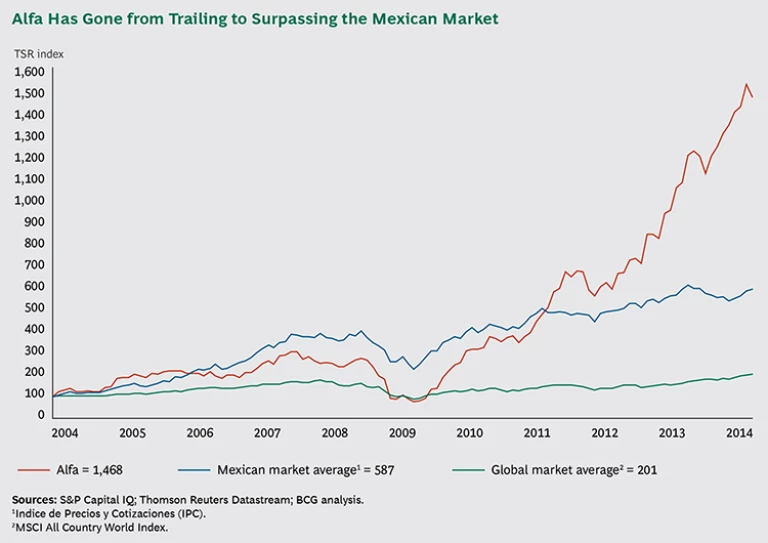The Mexican conglomerate Alfa, with an average annual TSR of 68.9 percent from 2009 through 2013, is the top value creator among multibusiness companies in the 2014 BCG Value Creators report. Alfa's success in redirecting its TSR trajectory during this period is also a classic example of a TSR turnaround.
The exhibit below tracks Alfa’s TSR for the ten years from 2004 through 2013 against the performance of both the leading Mexican market index and the MSCI All Country World Index. It shows that, starting in early 2006, Alfa’s TSR began to lag the Mexican market average—a lag that was exacerbated by the impact of the 2008 financial crisis. Since then, however, the company’s TSR has achieved a remarkable comeback, outpacing the Mexican market average considerably.
What explains Alfa’s turnaround? The company’s origins go back to 1974, when it began as a Mexican family-owned conglomerate. With a core business in the steel industry, the company made a series of unrelated acquisitions until, by the late 1970s, Alfa was operating in nine sectors of the Mexican economy, including steel, paper and packaging, synthetic fiber, electronics, real estate and tourism, petrochemicals, mining, and communications.
Alfa almost went bankrupt during the Mexican financial crisis of 1982, an experience that led to two waves of major portfolio transformation. The first, which was completed in the early 1990s, focused the company on four main sectors—steel, petrochemicals, food, and a small collection of diverse businesses. The second, which took place in the early years of the new century, caused Alfa to focus even more on those businesses with the greatest prospects for growth and profitability.
In 2004, the company sold off part of its legacy steel business, and it fully exited the business in 2005. In 2006, it started a joint venture with Pioneer Natural Resources to explore for natural gas in Texas. By 2008, Alfa’s portfolio had been completely transformed; none of the company’s original businesses remained. It had also shifted from being primarily in the Mexican domestic market to having a much more international presence.
This transformation, however, didn’t prevent Alfa from being hit hard by the 2008 financial crisis. Its automotive-components business was seriously threatened by the possible bankruptcy of GM. And major exposure in the market for financial derivatives caused the company to lose roughly $1 billion in market capitalization as its equity value declined by a massive 75 percent. Never-theless, Alfa was well positioned to take advantage of the postdownturn rebound. The solid positioning of its businesses and the measures it took to address new market conditions (for example, taking advantage of cheaper debt) allowed the company to report its best year ever in 2009, ending the year with a leaner cost structure and a stronger financial condition.
Today, Alfa is the world’s largest independent producer of aluminum-casted engine components for the automotive industry and one of the world’s largest producers of polyester (PTA, PET, and fibers). It is the leading maker of processed meats in North America, as well as a leading company in IT and communications services for the business segment in Mexico. Finally, its early investment in the U.S. natural-gas business positioned Alfa to take advantage of recent moves to deregulate the Mexican energy industry. With an estimated $16 billion in 2013 revenue, the company has become the third-largest industrial group in Mexico. In the five-year period of our study, it nearly doubled its earnings from $8.5 billion in 2009, a compound annual growth rate of 14 percent, and its cash flow grew by 11 percent per year, from $1.1 billion to $1.9 billion.
In short, Alfa made some tough decisions (exiting its legacy business), refocused its portfolio on those businesses with the greatest TSR potential, used the 2008 crisis to fix its balance sheet, and took some sensible strategic risks to enter new markets (such as natural gas). The result was a stellar five-year TSR performance. But Alfa’s management can’t rest on its laurels. The question today is whether the company’s portfolio is well positioned for the future. And the challenge for Alfa’s management will be to come up with a value creation strategy that will allow it to beat expectations once again in order to continue to deliver superior TSR.






